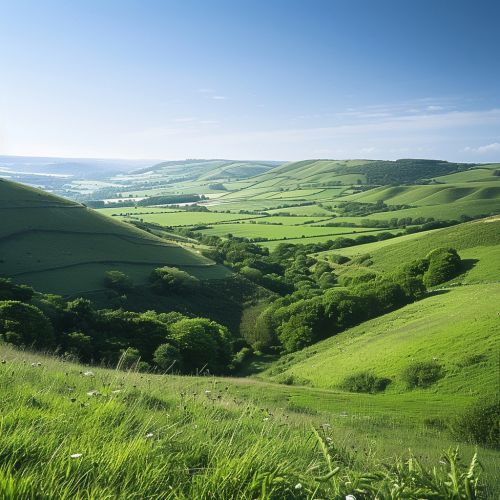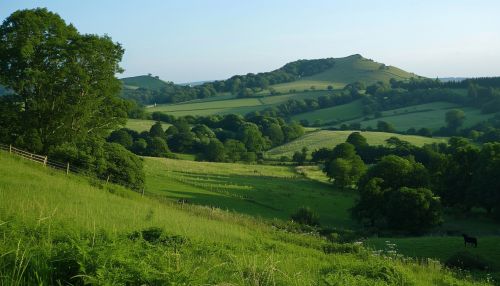England
Geography
England is located in the north-western part of the continent of Europe, and is the largest and most populous constituent country of the United Kingdom. It is bounded to the north by Scotland and to the west by Wales, its land border with Scotland being 96 miles (154 km) and with Wales being 160 miles (257 km). To the east and south, it is bordered by the North Sea, the English Channel and the Celtic Sea respectively, giving it the 12th-longest coastline in the world.


The terrain in England varies significantly from one region to another. The north of England is dominated by sparsely populated uplands such as the Pennines and the Lake District, which contain some of the country's highest peaks. The Midlands region is characterized by relatively flat plains, while the south of England features rolling hills and fertile lowlands.
History
The history of England is a vast and complex subject, spanning thousands of years from prehistoric times to the present day. The earliest known evidence of human presence in the area now known as England was that of Homo antecessor, dating to approximately 780,000 years ago. The Roman Empire invaded Britain in AD 43, leading to the establishment of the province of Britannia.
Following the fall of the Roman Empire, England was invaded by a number of Germanic tribes, including the Angles, Saxons, and Jutes. The Anglo-Saxon period in England lasted from the 5th to the 11th century, and was characterized by a series of kingdoms known as the Heptarchy.
The Norman Conquest in 1066 led to significant changes in English society and government. The Plantagenet dynasty, which began in the 12th century, saw the establishment of a strong centralized state.
The Tudor period (1485–1603) was a time of significant change in England. The English Reformation, which separated the Church of England from papal authority, was a major event of this period. The Elizabethan era, named after Queen Elizabeth I, was a time of relative stability and economic prosperity.
The Industrial Revolution, which began in the late 18th century, transformed England from a largely agrarian economy into the world's leading industrialized nation. This period also saw significant social and political changes, including the expansion of the franchise and the growth of the Labour movement.
Politics
England does not have a separate political system from the rest of the United Kingdom. The UK Parliament, located in Westminster, is the supreme legislative body in the country. The Monarchy of the United Kingdom is the constitutional monarchy of the United Kingdom, its dependencies and its overseas territories.
The Prime Minister of the United Kingdom is the head of government and is appointed by the monarch. The Prime Minister is usually the leader of the political party that has the most seats in the House of Commons.
Local government in England is structured in a two-tier system, with responsibilities divided between county councils and district, borough or city councils. There are also unitary authorities, which combine the functions of county and district councils.
Economy
The economy of England is the largest part of the UK's economy, which is the fifth-largest national economy in the world by nominal GDP and the ninth-largest by purchasing power parity. England is a highly industrialized country, and it's known for its high-tech and creative industries.
It is also a major player in aerospace, pharmaceuticals, and the automotive industry. The City of London is one of the world's leading financial centres, and the service sector, particularly banking, insurance, and business services, is a major part of the English economy.
Culture
English culture is a blend of influences from its history, from the indigenous Celtic people and Roman occupation, through the Anglo-Saxon and Viking invasions, to the impact of the British Empire. It has a rich literary history, with famous English authors including William Shakespeare, Jane Austen, and Charles Dickens.
The English language itself is a major cultural export, and English literature, drama, and poetry are known worldwide. England has also made significant contributions to music, cinema, art, and fashion.
